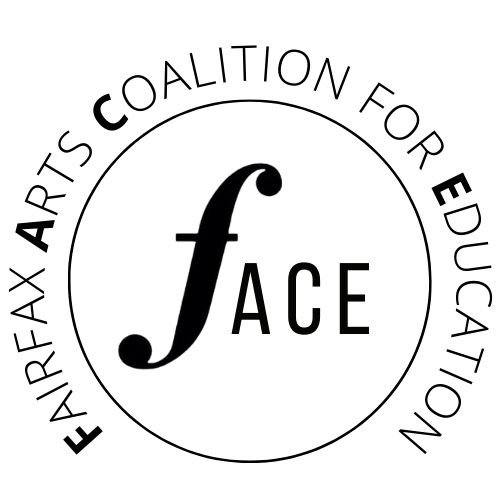FACE ADVOCACY
FACE works closely with the FCPS school board to advocate for music education in FCPS, both inside and outside of budget season. For updates on what we are doing, become a FACE member and get access to our newsletter which includes advocacy updates and helpful cut and paste advocacy resources!
Arts Advocacy Links
Parent Handbook on State Standards Arts Education Collaborative of Pittsburgh
The Support Music Community Action Kit: Lots of resources (some in Spanish)
“How schools stifle creativity” incredible speech by Sir Ken Robinson, PHD
“Arts Edge” Link to documented studies supporting the positive effect of the Arts
If you have a link to an advocacy video, speech, study, research, etc. please send to mscello@cox.net
Benefits of Music and the Arts in Education and Society
Student Performance
The College Entrance Examination Board found that students involved in public school music programs scored 107 points higher on the SAT’s than students with no participation.
- Profiles of SAT and Achievement Test Takers, The College Board,
compiled by the Music Educators National Conference (2002)
U.S. Department of Education data on more than 25,000 secondary school students found that students who report consistent high levels of involvement in instrumental music over the middle and high school years show “significantly higher levels of mathematics proficiency by grade 12.”
- U.S. Department of Education NELLS88 Database
Public Support and Access
According to a 2003 Gallup survey, 95 percent of Americans believe that music is a key component in a child’s well-rounded education.
- American Attitudes on Music, Music Making and Music Education, The Gallup Organization 2003
In spite of this public support and documented benefits, “only one in four eighth graders reported being asked to sing or play a music instrument at least once a week.”
-1998 NAEP Assessment
Life Skills
Arts involvement teaches children many skills necessary to succeed in life, including problem solving and decision making, building self-confidence and self-discipline, the ability to imagine what might be and to accept responsibility for it, teamwork, the development of informed perception, and articulating a vision.
- Compiled from various research documents and reports
Secondary students who participated in band or orchestra reported the lowest lifetime and current use of all substances (alcohol, tobacco, illicit drugs).
- Texas Commission on Drug and Alcohol Abuse, Houston Chronicle, January 11, 1998
Scientific Research
A research team reports that early music training dramatically enhancing children’s abstract reasoning skills. These findings indicate that music uniquely enhances higher brain functions required for mathematics, chess, science and engineering.
-From Neurological Research, Feb 28, 1997; Frances Rauscher, Ph.D., Gordon Shaw, Ph.D, University of California, Irvine
A two-year Swiss study involving 1,200 children in 50 schools showed that students involved in the music program were better at languages, learned to read more easily, showed an improved social climate, showed more enjoyment in school, and had a lower level of stress than non-music students.
-Weber, E.W., Spychiger, M. & Patry, J.L. (1993)
Arts and the Economy
America’s nonprofit arts industry generates $134 billion in economic activity every year, including $24.4 billion in federal, state, and local tax revenues.
- Americans for the Arts
- National Assembly of State Arts Agencies

